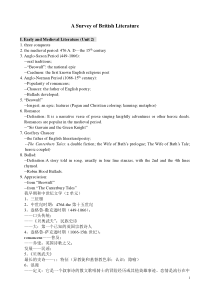 DOC
DOC
【文档说明】英国文学史知识要点总结副本.doc,共(10)页,106.000 KB,由精品优选上传
转载请保留链接:https://www.ichengzhen.cn/view-330109.html
以下为本文档部分文字说明:
1ASurveyofBritishLiteratureI.EarlyandMedievalLiterature(Unit2)1.threeconquests2.themedievalperiod:476A.D—the15thcentury3.Anglo-SaxonPeriod(44
9-1066):--oraltraditions;--“Beowulf”:thenationalepic--Caedmon:thefirstknownEnglishreligiouspoet4.Angl
o-NormanPeriod(1066-15thcentury):--Popularityofromancens;--Chaucer:thefatherofEnglishpoetry;--Balladsdeveloped;5.“Beowulf”
--longest;anepic;features(PaganandChristiancoloring;kenning;metaphor)6.Romance--Definition:Itisanarrativeverseofprosesingingkni
ghtlyadventuresorotherheroicdeeds.Romancesarepopularinthemedievalperiod.--“SirGawainandtheGreenKnight”7.GeoffreyCha
ucer--thefatherofEnglishliterature/poetry;--TheCanterburyTales:adoublefiction;theWifeofBath’sprologue;TheWifeofBath’sTale;heroiccouplet)8.Ballad:-
-Definition:Astorytoldinsong,usuallyinfourlinestanzas,withthe2ndandthe4thlinesrhymed.--RobinHoodBallads.
9.Appreciation:--from“Beowulf”--from“TheCanterburyTales”我早期和中世纪文学(2单元)1。三征服2。中世纪时期:476d-the第十五世纪3。盎格鲁-撒克逊时期(449
-1066):——口头传统;——《贝奥武夫”:民族史诗——大:第一个已知的英国宗教诗人4。盎格鲁-萨克逊时期(1066-15th世纪):romancens——普及;——乔叟:英国诗歌之父;发展——民谣;5。《贝
奥武夫》最长的史诗——;;特征(异教徒和基督教色彩;认识;隐喻)6。浪漫——定义:它是一个叙事诗的散文歌唱骑士的冒险经历或其他英雄事迹。恋情是流行在中2世纪时期。——“加文爵士与绿骑士”7。杰弗里乔叟——英国文学之父/诗歌;——坎特伯雷
故事:一个双小说;巴斯太太的序幕;巴斯太太的故事英雄双韵体);8。民谣:——定义:讲述的故事,歌曲,通常在四行诗节,与第二和第四行押韵。——知更鸟罩歌谣。9。欣赏的:——从“贝奥武夫》——从“坎特伯雷故事集II.TheRenaissance(Un
it3,Unit4,Unit5,Unit6)1.threediscoveries2.Renaissance--athristingcuriosityforclassicalliterature;--akeeninterestinlife
andhumanactivities.3.Humanism--individualism;thejoyofthepresentlife;reason;theaffirmationofself-worth--Humanismemphasizesthedignityofhumanbeingsan
dtheimportanceofthepresentlife.Humanistsvoicedtheirbeliefsthatmanwasthecenteroftheuniverseandmandidnotonlyhavetherighttoenjoytheb
eautyofthepresentlife,buthadtheabilitytoperfecthimselfandtoperformwonders.4.Sonnet:--Definition:Itisapoemof14l
inesthatfollowsastrictrhymeschemeandspecificstructure;itexpressesasingleideaortheme.(ThomasWyattfirstintroducedittoEngland)5.Shakespeareansonnet:--De
finition:AShakespeareansonnetconsistsofthreefour-linestanzas(calledquatrains)andafinalcoupletcomposediniambicpentameterwiththerhymeschemeaba
bcdcdefefgg.6.Blankverse:havingaregularmeter,butnorhyme.(HenryHoward,EarlofSurrey)7.Spenserianstanza:--Definition:Eachstanzacont
ainsninelinesintotal:eightlinesiniambicpentameterfollowedbyasingle'Alexandrine'lineiniambichexameter.Therhymeschemeoftheselinesis"ababbcbcc."
8.Appreciation:--EdmundSpenserand“TheFaerieQueene”(writteninblankverse)--ThomasMoreand“Utopia”--Chri
stopherMarlowe’sDr.Faustus(Appreication);Tamburlaine;TheJewofMalta;ThePassionateShepherdtoHisLove;--Sonnet18byShakespear
e(“ShallICompareTheetoaSummer’sDay”):time,mortality,immortality9.ThefirstEnglishessayist:FrancisBacon(“OfStudies”)10.Elizabetha
ntheatre—thegoldenageofEnglishdrama;11.Shakespeareancomedies:AsYouLikeIt;TheMerchantofVenice;AMidsummerNight‘sDream;Much
AdoAboutNothing;TwelfthNight12.Shakespeareantragedies:Macbeth;KingLear;Hamlet;Othello313.Shakespeareancomedies:--Features:clowns,se
rvants,jesters,fools;dramaticirony;mistakenidentity,cross-dressing;--Patterns:TheGreenWorldPattern(Sample:AMid-s
ummerNight’sDream)19.Shakespeareantragedies:--Features:characters;structure;soliloquy;traveling;theroleoffate/chance20.Appreciation:--“To
be,ornottobe”(fromHamlet)(Hamlet’sdilemma)--“Tommorrow,tomorrow,…”(fromMacbeth)(Mabethistiredoftheworld;boredwithlife;metaphors:)②。文艺复兴时期(3单元
,4单元,5单元,6单元)三发现1。文艺复兴时期的2。——一个thristing好奇心古典文学;——一个热衷于生活和人类活动。3人本主义。——个人主义;欢乐的生命之本;原因;肯定自我价值——人本主义强调人的尊严的重要
性和目前的生活。人文主义者表示他们的信仰,人是宇宙的中心,人类不仅有权享受美丽的生活,但有能力去完善自己,创造奇迹。4首十四行诗:——定义:它是14行诗,有严格的韵律和具体的结构;它表示一个单一的观念或主题。(托马斯怀亚特首先介绍到英
国)5。莎士比亚的十四行诗:——定义:莎士比亚的十四行诗由三行诗节(称为绝句)和最后对联中的五音步抑扬格的韵是由光盘。6。无韵诗:经常有一个表,但没有韵。(霍华德,萨里伯爵)7。斯宾塞诗节:——定义:每节包含九行共八行抑扬格五音步其次是一个单
一的“同上”线六步抑扬格写成的。这些线的韵律是“ababbcbcc。”8赞赏:——埃德蒙斯宾塞和“仙后”(写在空白的诗)——托马斯更多的“乌托邦”——克里斯托弗·马洛的浮士德博士(appreication);帖木儿;马耳他的犹太人;热
情的牧人对他的爱人;——莎士比亚十四行诗18(“我可否将你比作一个夏日的一天”):时间,死亡率,不朽9。第一个英国散文家:弗兰西斯(“研究”)10theatre-the。伊丽莎白时代英国戏剧的黄金时代;11:莎士比亚喜剧。你喜欢它;威尼斯商人;仲夏夜之梦;无事生非;第十二夜12。莎士比亚
悲剧:麦克白;王李尔;奥瑟罗哈姆雷特;13。莎士比亚喜剧:——特点:小丑,小丑,傻瓜;仆人,戏剧性反讽;错误的身份,变装;——模式:绿色世界格局(样本:仲夏夜之梦)19。莎士比亚悲剧:特点:特征——;结构;独白;旅
游;命运的作用/机会20。欣赏的:——“是,或不是”(哈姆雷特)(哈姆雷特困境)4——“明天,明天,……”(从麦克白)(克贝斯是世界之累;无聊的生活;隐喻:)III.ThePeriodofRevolutionandRestoration(the17thcentury)(Unit7)
1.17th:thebeginningofmodernEngland;2.Cavalierpoets:--Reflectedtheroyalistvalues;--Themes:beauty,love,loyalty,morality;--Style:Dire
ct,short,franklyerotic--Motto:“CarpeDiem”“SeizetheDay”--RobertHerrick,BenJohnson,RochardLovelace,etc;--Appreciation:“TotheVirgins,toMakeMuchofTime”(H
errick;“toseizetheday”)3.Metaphysicalschool:--thefounderoftheMetaphysicalschool:JohnDonne--conceit:anextendedmetahporinvolvingdramaticcontrasts
orfar-fetchedcomparisons;--JohnDonne’slovepoems:“TheFlea”;“Valediction:ForbiddenMourning”(Appreciation)--AndrewMarvell:“ToH
isCoyMistress”4.Puritanwriters:--JohnBunyanh:“ThePilgrim’sProgress”(areligiousallegory)--JohnMilton:“ParadiseLost”(b
asedonTheOldTestament)(‘ParadiseRegained”;“SamsonAgonistes”)(Appreciation)IV.The18thCenturyLiterature—TheAgeof
Enlightenment(Unit8andUnit9)1.18thcentury:thegoldenageofEnglishnovels2.Enlightenment--anintellectualmovementin
Europeinthe18thcentury;--Reasonastheguidingprincipleforthinkingandaction;--thebeliefineternaltruth,eternaljus
tice,naturalequality;--acontinuationofRenaissance;(Beliefinthepossibilityofhumanperfectionthrougheducation).3.Neo-classicism:--
Arevivalofclassicalstandardsoforder,harmony,balance,simplicityandrestrainedemotioninliteratureinthe18thcentury.--AlexanderPope4
.“EssayonCriticism”byAlexanderPope--amanifestoofneoclassicism;--Appreciation:“ALittleLearningisaDangerou
sThing…”(learningasmountainclimbing;inadequatelearningmayimpairabalancedapprecationofapoem).5.Realisticnov
els:--JonathanSwift;Gulliver’sTravels;AModestProposal;ATaleofaTub;TheBattleoftheBooks;--DanielDefoe:RobinsonCrusoe;(Appreciation)--HenryFie
lding:TomJones;JosephAndrews;JonathanWildetheGreat;6.Sentimentalism--themiddleandlaterdecadesofthe18thc.;--definition:passionoverreason,per
sonalinstinctsoversocialduties;thereturnofthepatriarchaltimes;lamentingoverthedestructiveeffectsofindustrialization--OliverGoldsmith,Thomas
Gray,etc.57.TheGraveyardSchool--subjects,style;--ThomasGray’s“Elegywritteninacountrychurchyard”:structure;t
heme;(Appreciation)8.Pre-romanticism:--thelatterhalfotthe18thcentury;--RobertBurns:“AuldLyneSyne”;“ARed,RedRose”--WilliamBlake:“SongsofI
nnocence”“SongsofExperience”;“TheLamb”,“TheTyger”;9.RichardBringsleySheridan:TheSchoolforScandal;TheRivals;10.Olive
rGoldsmith:TheVicarofWakefield;SheStoopstoConquerV.TheRomanticPeriod(1789-1832)(Unit10,Unit11andUnit12)1.TheRo
manticperiod:anageofpoetry2.Romanticism:--ManifestoofBritishRomanticism:LyricalBallads:co-publishedbyWordsworthand
Coleridge--Features:individualasthecenterofalllifeandexperience;fromtheouterworldtotheinnerworld;Passion;i
magination;Nature;pastoral;past;Individualfreedom;simpleandspontaneousexpression;symbolicpresentations;fantast
icelements;3.EnglishRomanticPoets--LakePoets:Wordsworth,Coleridge,Southey--TheSatanicPoets:Byron;Shelley;Kea
ts--LyricalBallads:themanifestooftheEnglishMovement;4.WilliamWordsworth--“aworshipperofnature”;--natureandcountrypoems:“IWan
dereredLonelyasaCloud”;“TheWorldisTooMuchwithus”;“TinternAbbey”;“ToaButterfly”“TheSolitaryReaper”;“LucyPoems”;--theoriesonpoetry;“Poetryisasponta
neousoverflowofpowerfulfeelings;ittakesitsorginfromemotionrecollectedintranquility.”--Wordsworth’sviewofnature:critiqueofmaterialism;asourceofme
ntalcleanliness;theguardianoftheheart;thebeneficialinfluenceofnature;--Appreciation:“IWandereredLone
lyasaCloud”;“TinternAbbey”;5.SamuelTaylorColeridge:“TheRimeoftheAncientMariner”6.GeorgeGordonByron:-
-ByronicHero:anidealisedbutflawedanti-herocreatedbyByron;loveoffreedom,hatredoftyranny,passionate,rebellious,chivalrous,arr
ogant,cynical,individualistic,isolated,single-handedly,melancholy--majorpoemsbyByron:“ChildeHarold’sPilgrimage”(ByronicHero);“DonJuan”;“SheWal
ksinBeauty”;“TheIslesofGreece”(Appreciation)7.PercyByssheShelley:--Plato’sinfluence;pantheism--“PrometheusUnbound”;“O
detotheWestWind”“PrometheusUnbound”;“OdetoaSkylark”;“QueenMab”;“ADefenseofPoetry”;--Appreciation:“OdetotheWestWind”:th
emesofdeathandrebirth;destructionandregeneration;8.JohnKeats--“OdeonaGrecianUrn”;“OdetoaNightingale”;“OdetoAutumn”;“Endymi
on”;“Isabella”6--Appreciation:“OdeonaGreicanUrn”:thepowersandlimitationsofart三、革命时期和恢复(第十七世纪)(7单元)1。第十七:开始现代英
国;2骑士派诗人:———价值体现;——主题:美,爱,忠诚,道德;——风格:直,短,坦白色情——格言:“及时行乐”“只争朝夕”——罗伯特·赫里克,本约翰逊,罗德洛夫莱斯,等;——欣赏:“处女,使大部分时间”(赫里克;“只争朝夕”)3玄:——创办的学校:约翰多恩的形而上学——骄
傲:扩展metahpor涉及戏剧性反差或牵强的比较;——约翰多恩的爱情诗:“跳蚤”;“告别紫禁城丧”(欣赏)——安得烈马维尔:“他羞怯的情人”4的清教徒作家:——约翰bunyanh:《天路历程》(宗教寓言)——约翰密尔
顿:“失乐园”(根据旧约)('paradise恢复”;“力士参孙”)(欣赏)四。第十八世纪文学的启蒙时代(8单元和9单元)1。第十八世纪英国小说的黄金时代2个启示。——一个智力运动在欧洲的第十八世纪;——原因为指导原则的思想和行动;——信仰永恒的真理,永恒的正义,平等;——继续文艺复兴;(信仰的可
能性,人类完美通过教育)。3新古典主义:——复兴古典标准秩序,和谐,平衡,简单和约束文学中的情感在第十八世纪。——亚力山大·波普4。”论批评”的亚力山大教皇——一个新古典主义的宣言;——欣赏:“一知半解是一件危险的事情……”(学习登山;不
足学习可能损害评价的博弈均衡的诗)。5现实主义小说:——乔纳森;格列佛游记;一个温和的建议;浴缸的故事;书籍的战斗;——丹尼尔笛福:鲁滨孙漂流记;(欣赏)——汤姆·琼斯;安德鲁斯;乔纳森怀尔德大帝;6。感伤的——后期几十年的第十八;定义:激情——理性,个人本能的社会职责;返回的时
间;而惋惜的破坏性影响的产业化——奥利弗·戈德史密斯,托马斯灰色,等。7。墓地——主题,风格;——托马斯灰色的“写在教堂墓地的挽歌”:结构;主题;(欣赏)8。浪漫主义:7——后者的一半第十八世纪;——罗伯特:“美好时光”莱恩”;红色,红玫瑰
”——威廉·布莱克:《天真之歌》《经验之歌》;“羔羊”,“老虎”;9。李察谢里丹:bringsley造谣学校的对手;10。奥利弗·戈德史密斯:威克菲尔德牧师的;她弯下腰去征服VITheVictorianLiter
ature(1832-1901)(Unit13andUnit14)1.AuthorsandWorks--WilliamMakepeaceThackray:VanityFair--GeorgeEliot:TheMillo
ntheFloss;SilasMarner;Middlemarch;AdamBede--JaneAusten:PrideandPrejudice:Emma;SenseandSensibility;Mansf
ieldPark--ThomasHardy:FarfromtheMaddingCrowd;TessoftheD’Urbervilles;JudetheObscure;TheReturnoftheNative;TheMayorofCasterbridge--CharlotteBront
e:JaneEyre;Shirley;--EmilyBronte:WutheringHeights--OscarWilde:TheImportanceofBeingEarnest;AWomanofNoImportance--Wal
terScott:Ivanhoe;1.BronteSistersandtheFemaleGothicTradition:--FemaleGothicreferstothetraditionofGothi
cwritingbywomen...thatrepresentsthefemaleexperiencewithindomesticityasoneofimprisonment,claustrophobiaandterror.2.Ap
preciation:--JaneEyrebyCharolotteBronte;--WutheringHeightsbyEmilyBronte;3.Naturalism--Definition:Heredityandsocialenvironmentastheshapingf
orcesofone’scharacter;todetermine"scientifically"theunderlyingforcesinfluencingtheactionsofthecharacters.pessimism;fatalism;detachedpe
rspective;--Appreciation:“TessofD’Urbervilles”byThomasHardy4.Aestheticism--OscarWilde4.CharlesDickens:--OliverTwist;DavidCo
pperfield;ATaleofTwoCities;HardTimes;GreatExpectations;ThePickwickPapers;LittleDorrit5.Poets--AlfredTennyson:“Break,Break,Break”--RobertBro
wning:“MyLastDuchess”(dramaticmonologue)--MathewArnold:“DoverBeach”(Appreciation)6.ThomasHardy--“ShakespeareoftheEnglishnovel
.”--novelsofcharacterandenvironment:FarfromtheMaddingCrowd;TessoftheD’Urbervilles;JudetheObscure--fata
lism;--naturalistictendencies;7.GeorgeBernardShaw--thegreatestIrishdramatistinthe20thc.--amemberoftheFabiansociety;reform
istideas--Plays:Mrs.Warren’sProfession;MajorBarbara88.JohnGalsworthy--TheForsyteSaga:TheManofProperty,I
nChancery,andToLet.--Analysis:TheManofProperty六维多利亚文学(1832-1901)(13单元和14单元)1。作者和作品——威廉·撒克里:名利场——爱略特:弗洛斯河上的磨坊马尔纳;西
拉斯;亚当·比德米德尔马契;——简奥斯丁:傲慢与偏见:理智与情感;艾玛;曼斯菲尔德公园——托马斯·:远离尘嚣;苔丝悲剧;图书;土著人的回归;在卡斯特桥市长——勃朗特:简·爱雪莉;——艾米丽勃朗特:呼啸山庄——奥斯卡怀尔德:认真的重要性;无足轻重的女人——史葛:巴黎;1。
勃朗特姐妹和女性哥特传统:——女性哥特指的是传统的哥特式妇女写作。的。这代表了女性在家庭生活经验为一体,幽闭恐怖。2赞赏:——简·爱的charolotte勃朗特;呼啸山庄——由艾米丽勃朗特;3自然主义。——定义:遗传和社会环境的塑造力量的人的性格;确
定了“科学”的基本力量影响行动的字符。悲观宿命论观点;分离;——欣赏:“苔丝托马斯·德伯家”4。”——奥斯卡怀尔德4。查尔斯狄更斯:——奥利弗戴维;科波菲尔;一两个城市的故事;困难;期望;匹克威克外传;小杜丽5。诗人——艾尔弗雷德丁尼生:“打破,打破,
打破“——罗伯特:“我最后的公爵夫人》(戏剧独白)——阿诺德:“多佛海滩”(欣赏)6。托马斯·——“莎士比亚的英文小说。”——“性格与环境小说:远离尘嚣;苔丝悲剧;图书——宿命论;——自然主义的倾向;7。萧伯纳——最伟大的爱尔兰剧作家在第二十℃。——费边社成员的改良主义思想;——发挥:华伦夫人的
职业;大巴巴拉8。约翰高尔斯华绥——福尔赛世家:财产的人,在大法官,并让。——分析:有财产的人VII.TheModernPeriod(Unit15)1.Modernism:--theorecticalbasis;9--innovativeforms;--thematicconcerns;3.S
teamofconsciousnessnovel:--Bergson’stheoryofpsychologicaltime;--Definition:Thestyleofwritingthatattemptstoimitatethenaturalflowofacharacte
r’sthoughts,feelings,reflections,memories,andmentalimagesasthecharacterexperiencesthem.--VirginiaWoolfandJamesJoyce4.V
irginiaWoolf--“ModernFiction”(attackedthetraditionalwayofnovel-writing)--Mrs.Dalloway;TotheLighthous
e;TheWaves--Mrs.Dalloway:appreciation5.JamesJoyce--anIrishwriter;--Dubliners,APortraitoftheArtistasaYoungMan,Ulysses--Ulysses(Theme,techniques)6
.PsychologicalFiction--Freudian’stheories;--D.H.Lawrence:SonsandLovers;TheRainbow;WomeninLove;LadyChatterley’sL
over--SonsandLovers:appreciation7.Otherimportantwriters:--E.M.Forster:APassagetoIndia;ARoomwithaView;WhereAngelsFeartoTread;HowardsEnd;--Willi
amGolding:LordoftheFlies;--JosephConrad:HeartofDarkness;LordJim;第七。现代时期(15单元)1。现代主义:——理论基础;——创新形式;——的专题问题;3。意识流小说:——柏格森的理论,心理时间;—
—定义:写作风格,试图模仿人物的思想,感觉,思考,记忆,和心理图像为特征的经验。——伍尔夫与杰姆斯乔伊斯4。伍尔夫——“现代小说”(攻击的传统小说创作)——达洛维夫人的灯塔;波;——达洛维夫人:欣赏5。杰姆斯乔伊斯—
—爱尔兰作家;——都柏林,艺术家的画像作为一个年轻人,尤利西斯——尤利西斯(主题,技术)6。心理小说——弗洛伊德的理论;——D.H.劳伦斯:儿子和情人;彩虹;恋爱中的女人;查泰莱夫人的情人——儿子和情人:欣赏7。
其他重要的作家:10——E·M·福斯特:印度之行;有风景的房间;天使恐惧胎面;而结束;——威廉·戈尔丁:苍蝇王;——康拉德:黑暗的心;吉姆勋爵;VIII.PostwarLiterature(Unit16)1.Existentialism--“
Existenceprecedesessence”--Theme;2.TheatreoftheAbsurd--SamuelBeckett:Nobelprize--HaroldPinter:NobelPrize--Definition--WaitingforGodot
(Beckett):3.AngryYoungMan:--mid-1950s;--JohnOsborne:LookBackinAnger4.Metafiction:--definition:--JohnFowles:TheFrench
Lieutenant’sWoman5.Symbolism:--definiton;--T.S.Eliot:“TheWasteLand”(spiritiualempitnessandemotionalimpoverishment)--WilliamButlerYeats:“Sailing
toByzantium”;(Appreciation)“TheSecondComing”;“LedaandtheSwan”;第八。战后文学(16单元)存在主义的1。——“存在先于本质”——主题;2。荒谬剧场——塞缪尔贝克特:诺贝尔奖——哈罗德·品特:诺贝尔奖——定义——等
待戈多(贝克特):3。生气的年轻人:——50;——约翰奥斯本:愤怒的回顾4。元小说:——定义:——约翰福尔斯:法国中尉的女人5。象征主义:——定义;——T·S·爱略特:《荒原》(spiritiualempitness和情感贫
困)——威廉叶芝:《驶向拜占庭”;(欣赏)“秒”;“丽达与天鹅”;
 辽公网安备 21102102000191号
辽公网安备 21102102000191号
 营业执照
营业执照